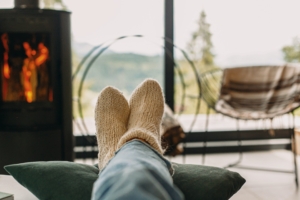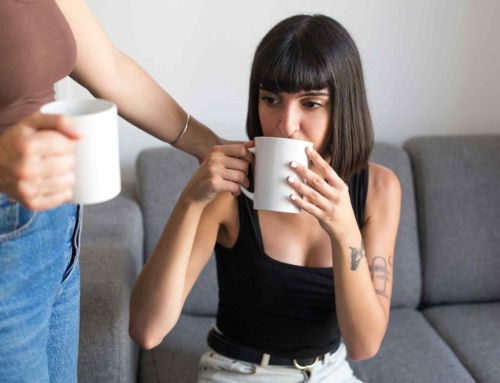There are situations you find yourself in that make you feel unsettled, maybe a little sick, or nervous. For you, that could be when you’re getting ready for an important date, when you sit down for your first interview, or if you have to deliver material in public. Being anxious is a common experience, and it’s one that typically doesn’t interrupt a person’s daily functioning, so it doesn’t necessary require one to find ways to reduce anxiety.
 However, in some instances, and for some people, anxiety is a crushing weight that they must carry every day. Seemingly normal things like meeting new people, eating in public, or asking a question, may appear like an impossible ask.
However, in some instances, and for some people, anxiety is a crushing weight that they must carry every day. Seemingly normal things like meeting new people, eating in public, or asking a question, may appear like an impossible ask.
Anxiety can end up making it hard to socialize with others, and that can put a serious cramp on one’s social life. Such anxiety, which may be diagnosed as an anxiety disorder, can affect day-to-day activities as well as a person’s relationships, self-esteem, and mental health.
Whether you’re dealing with mild anxiety or anxiety that significantly reduces your functioning, there are ways of dealing with it that help you without hurting you, and knowing them can be a huge help. Agoura Christian Counseling can guide you in finding effective strategies to manage anxiety and improve your well-being.
Common signs of anxiety and anxiety disorders.
If it’s your first time feeling anxious, it may be an overwhelming experience. Even if anxiety is familiar to you, it can be hard getting used to what anxiety does to you, and how it manifests physically and emotionally. Some of the signs of anxiety and anxiety disorders include:
- Increased heart rate, or heart palpitations.
- Hyperventilation or shortness of breath.
- Feeling nervous or unsettled.
- Obsessively thinking about the anxiety trigger.
- Feeling helpless and afraid.
- A sense of impending panic, danger, or doom.
- Sweating profusely.
- Upset stomach.
- Trembling or shaking.
- Avoiding certain places or situations that make you anxious.
One’s anxieties can be out of proportion to the actual danger they’re in, and they can cause you to avoid places or situations. These feelings of anxiety can interfere with daily activities and are often difficult to control. When a person has an anxiety disorder, even though they know their fear may not be rational, they still feel it nonetheless.
In Charles Dicken’s classic A Christmas Carol, the main character Ebenezer Scrooge has a ghostly visitation from his old business partner Jacob Marley. Scrooge, in trying to dismiss Marley’s upsetting warnings, says of Marley, “You may be an undigested bit of beef, a blot of mustard, a crumb of cheese, a fragment of underdone potato. There’s more of gravy than of grave about you, whatever you are!”
If you encounter the signs of anxiety, don’t dismiss them; instead, seek help from a medical professional, who may refer you to a mental health expert if they can find no underlying physical cause of your symptoms.
Some unhelpful ways to address anxiety.
It may be useful on occasion to know the sort of things that may not be helping you when it comes to dealing with your anxiety. Some unhelpful ways to reduce anxiety include the following:
Avoidance.
On a certain level, it makes sense that if something makes you uncomfortable, you should have less of that thing in your life. However, when you avoid the things that trigger your anxiety, those things tend to loom larger in your imagination. It becomes harder to overcome them, and therefore deepens your anxiety.
Using various substances to cope.
Some substances like caffeine or nicotine can give a somewhat temporary relief from the symptoms of anxiety. Over-reliance on over-the-counter medications can also be detrimental to your body and overall health. Other people also use alcohol or recreational drugs to deal with anxiety, and while these provide temporary relief, there can be many negative health side effects in the long run.
Eating to self–soothe.
The other way people often deal with uncomfortable feelings is to turn to food to self-soothe. Sugary and fatty foods may enhance your mood through the release of serotonin into your system, but over the long term, the consumption of such foods puts you at greater risk of conditions such as diabetes, heart disease, or obesity.
Too much screen time.
This can produce a feeling of well-being, but only briefly. As your brain becomes dependent on those bursts of dopamine, you require more and more screen time to achieve that same level of satisfaction. Dedicating large portions of your day to screen time not only becomes a habit that affects your mental health, especially if you find yourself doom scrolling endlessly, but it takes time away from healthier pursuits and connection with others.
 Self-isolation. I
Self-isolation. I
f being around other people feels overwhelming or nerve-wracking, the temptation may be to withdraw and isolate yourself. Just like with avoidance, if you rely on this too much and aren’t using it as an opportunity to regroup before heading back into the thick of it, self-isolation can end up leading to poorer mental and emotional health.
Sleeping too much.
We all need rest, especially when we’re feeling sapped or exhausted. It’s important to get enough quality rest. However, sleeping more than you need to can also be a form of avoidance, and it takes up time you could use to exercise or foster meaningful connection with other people.
Catastrophizing.
Another way that people try to deal with anxiety is by yielding to it and giving it its head. This can lead to catastrophizing, which is when you jump to conclusions about the worst possible outcomes of a situation and treat them as likely when they are not. Catastrophizing only leads to deeper anxiety and stress, as does making impulsive decisions based on feelings of anxiety.
Some people respond to their anxieties by ruminating, developing compulsions, or by being perfectionists. These all may seem to help in the short term, but they compound the problem and make it much worse.
Healthy and effective ways to reduce anxiety.
Having pointed out some of the things to avoid, how can you best reduce anxiety and bring it under control? Some ways to reduce anxiety include
Deep breathing and mindfulness.
When you’re in an anxiety-inducing situation, it’s helpful to know how anxiety works and how it affects your body. Deep breathing helps you to calm down, reducing the sense of being overwhelmed or in danger. Being both mindful and grateful can help you live in and experience the moment, instead of worrying about what happened or may still happen.
Other ways to reduce anxiety, such as progressive muscle relaxation, counting, visuaxlization, and other coping mechanisms can also help you to calm down when you’re feeling stressed and anxious. With practice and repeated use, you can deploy these techniques more easily in times of crisis.
Good self-care. Being able to get sufficient sleep, eat a balanced diet, and regular exercise helps your body cope with the shocks and demands of daily life.
Learn about your anxiety.
Knowing what makes you anxious and how you typically respond is valuable information that you can use. You can journal to discover your triggers, and this helps you when you’re practicing strategies for coping with anxiety. Learning about your anxiety also empowers you as you speak with your healthcare provider about what treatments might work best for you.
Maintain your social network.
It may be tempting to either withdraw or have an over-reliance on others to address your anxiety. Instead of isolating yourself, connect with your loved ones and do the activities you enjoy. They cannot resolve your anxiety for you, but they are a vital resource in grounding and supporting your journey.
Seek help.
We all have occasional feelings of anxiety; that is a normal part of life. However, if you experience frequent and excessive anxiety, or fear, terror, and panic in everyday situations, that may point strongly to an anxiety disorder. Such levels of anxiety are unhealthy as they can significantly affect your quality of life and prevent you from functioning normally.
 If your anxiety is getting in the way of you enjoying your life and relationships, talk with a doctor, counselor, or healthcare provider about your symptoms, and seek a proper diagnosis. Your doctor or healthcare provider can help rule out any possible underlying physical health issue that may be causing your symptoms, and they can direct you to a mental health professional if there are no underlying physical health issues at play. Agoura Christian Counseling can be a helpful resource to explore for additional support.
If your anxiety is getting in the way of you enjoying your life and relationships, talk with a doctor, counselor, or healthcare provider about your symptoms, and seek a proper diagnosis. Your doctor or healthcare provider can help rule out any possible underlying physical health issue that may be causing your symptoms, and they can direct you to a mental health professional if there are no underlying physical health issues at play. Agoura Christian Counseling can be a helpful resource to explore for additional support.
If you are diagnosed with anxiety or an anxiety disorder, the most effective treatment plan will vary, but most people with anxiety disorders need psychotherapy or medications to get their anxiety under control. Psychotherapy (talk therapy) can help you reframe your thoughts and develop healthy coping strategies.
In addition, lifestyle changes are also helpful. Keep your appointments for talk therapy and be consistent in taking whatever medication you’re prescribed. Sticking to your treatment plan makes a huge difference.
“Morning Coffee”, Courtesy of Kateryna Hliznitsova, Unsplash.com, Unsplash+ License; “Comfortable Socks”, Courtesy of Getty Images, Unsplash.com, Unsplash+ License; “Man and His Dog”, Courtesy of Jovan Vasiljević, Unsplash.com, CC0 License; “Happy Couple”, Courtesy of Getty Images, Unsplash.com, Unsplash+ License
-
Shirley Kauffman: Author
As a Licensed Marriage and Family Therapist, I provide faith-based counseling for individuals, couples, and families facing a wide range of issues including anxiety, depression, marriage problems, divorce, and other family issues. With God’s help, I’...
-
Kate Motaung: Curator
Kate Motaung is the Senior Writer, Editor, and Content Manager for a multi-state company. She is the author of several books including Letters to Grief, 101 Prayers for Comfort in Difficult Times, and A Place to Land: A Story of Longing and Belonging...
DISCLAIMER: THIS ARTICLE DOES NOT PROVIDE MEDICAL ADVICE
Articles are intended for informational purposes only and do not constitute medical advice; the content is not intended to be a substitute for professional medical advice, diagnosis, or treatment. All opinions expressed by authors and quoted sources are their own and do not necessarily reflect the opinions of the editors, publishers or editorial boards of Stone Oak Christian Counseling. This website does not recommend or endorse any specific tests, physicians, products, procedures, opinions, or other information that may be mentioned on the Site. Reliance on any information provided by this website is solely at your own risk.






